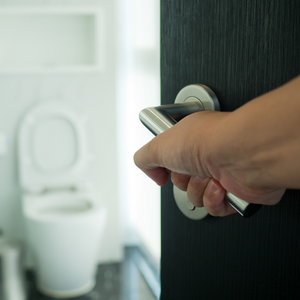Fecal incontinence

Loss of ability to control bowel movements is called fecal incontinence. While occasional or rare, incontinence due to a bout of diarrhea happens to most people. Persistent inability to control bowel movements usually indicates an issue with one of several mechanisms involved in control of bowel movements.
Maintaining continence or bowel control requires normal rectal sensory function and normal sphincter function (internal and external sphincters). Fecal incontinence ranges from an occasional leakage of stool while passing gas to a complete loss of bowel control or due to inability to stop the urge to defecate, inability to keep sphincters closed or due to lack of awareness of the need to pass stool.
Causes
- Diarrhea. Usually due to inability to control the urge or loss of rectal capacity.
- Constipation. Usually due to leakage of liquid stool around a hard mass of stool in the rectum.
- Muscle injury or damage usually sustained during rectal/anal surgery or childbirth especially if an episiotomy was performed or forceps/vacuum was used during delivery (incontinence usually occurs several decades after the injury).
- Nerve damage during childbirth, rectal/anal surgery or due to diabetes, multiple sclerosis, Parkinson’s disease and spinal cord injury/stroke.
- Hemorrhoids which keep the rectum from closing completely.
- Loss of rectal storage capacity due to inflammation, scarring, radiation or surgery.
- Rectal prolapse or protrusion of the rectum thru the anus or vagina leading to nerve and muscle damage.
Risk Factors
- Age.
- Female gender.
- Dementia.
- Nerve damage due to conditions such as diabetes, multiple sclerosis, Parkinson’s disease, etc.
- Physical disability.
- Anal and rectal surgeries.
Treatment & Prevention
Depending on the cause, it may be possible to improve or prevent fecal incontinence.
- Use of bulking agents such as fiber supplements and antidiarrheal medications can mitigate symptoms.
- Control diarrhea by evaluation and appropriate treatment of the cause or symptoms. This may involve testing with labs, stool tests, and colonoscopy.
- Improve constipation with dietary and behavioral modification or with medications.
- Cause of constipation may need further evaluation with lab tests, X-rays and function of the rectum and anus.
- Use of appropriate laxative therapy to ensure complete evacuation at specific times to avoid leakage later.
- Rectal sensation assessment. Often, impaired rectal sensation is the cause of leakage as the sphincter contracts only after perception of stool in the rectum.
- Sphincter damage assessment with rectal ultrasound to identify patients who can respond to surgical repair.
- Consultation with a rectal surgeon. Treatment options include use of injectables to bolster the anal sphincter or repair of the defect in the anal sphincter.
- In intractable situations, diversion of the fecal stream via colostomy is considered.
FAQs
Fecal incontinence is the inability to control bowel movements, resulting in the unintentional passage of feces.
There are many potential causes of fecal incontinence, including muscle or nerve damage, chronic constipation, diarrhea, inflammatory bowel disease, and certain medications.
- Diarrhea. Usually due to inability to control the urge or loss of rectal capacity.
- Constipation. Usually due to leakage of liquid stool around a hard mass of stool in the rectum.
- Muscle injury or damage usually sustained during rectal/anal surgery or childbirth especially if an episiotomy was performed or forceps/vacuum was used during delivery (usually occurs several decades after the injury).
- Nerve damage during childbirth, rectal/anal surgery or due to diabetes, multiple sclerosis, Parkinson’s disease and spinal cord injury/stroke.
- Hemorrhoids which keep the rectum from closing completely.
- Loss of rectal storage capacity due to inflammation, scarring, radiation or surgery.
- Rectal prolapse or protrusion of the rectum thru the anus or vagina leading to nerve and muscle damage.
Yes, fecal incontinence can often be treated with a combination of lifestyle changes, medications, and medical procedures. The specific treatment plan will depend on the underlying cause of the incontinence.
Fecal incontinence is more common than many people realize, with estimates suggesting that it affects up to 18% of adults. It can affect people of all ages, but it is more common in older adults.
Fecal incontinence is typically diagnosed through a combination of a physical examination, a review of medical history, and various tests such as anorectal manometry, defecography, and colonoscopy.
Fecal incontinence can lead to a number of complications, including skin irritation, infections, and social isolation. It can also have a significant impact on quality of life.
There are a number of things that people with fecal incontinence can do to manage the condition at home, including:
- Using incontinence products such as pads or underwear.
- Following a healthy diet and staying hydrated.
- Regularly exercising the pelvic floor muscles.
- Avoiding constipation by eating a high-fiber diet and staying hydrated.
- Evaluation and treatment of diarrhea.
- Using the bathroom when the urge to defecate arises.
There are no guaranteed ways to prevent fecal incontinence, but there are some steps that can help reduce the risk:
- Eating a healthy diet and staying hydrated.
- Exercising the pelvic floor muscles regularly.
- Avoiding constipation by eating a high-fiber diet and staying hydrated.
- Managing chronic conditions such as inflammatory bowel disease.
- Avoiding straining during bowel movements.
In most cases, fecal incontinence is not a sign of cancer. However, it is important to speak with a healthcare provider if you are experiencing fecal incontinence, as it can be a symptom of other underlying conditions that need to be treated.
In some cases, fecal incontinence can be cured with treatment. However, in other cases, it may be a chronic condition that requires ongoing management. The specific treatment plan will depend on the underlying cause of the incontinence.